7 November 2019
Room XXV, Palais des Nations, Geneva
Information meeting on the UPR process in Iraq and Iran
Speakers
Mr. Tahar Boumedra, former UN Human Rights Chief of the UN mission to Bagdad (UNAMI)
Mr. Christopher Gawronski, Senior Human Rights Officer at Geneva International Centre for Justice (GICJ)
Moderator
Ms. Isabela Zaleski Mori, Human Rights Researcher at Geneva International Centre for Justice (GICJ)
Organizers
International-Lawyers.Org, International Organization for the Elimination of All Forms of Racial Discrimination (EAFORD), and Geneva International Centre for Justice
Introduction

Ms. Isabela Zaleski Mori, the moderator, opened the side event by noting that in both Iraq and Iran, gross human rights violations are rife and that minorities, migrants, women, girls, children and persons with disabilities are particularly vulnerable to these violations.
In Iran, ethnic and religious minorities make up over 40 per cent of the population but face systematic discrimination in accessing senior public office positions. Moreover, the associations formed by minorities are denied freedom of expression and of association; they face unfair trials; torture and other ill-treatment are widespread and go unpunished. In addition, women and persons with disabilities face discrimination in both law and practice.
In Iraq, the atrocities perpetrated by ISIS (or Da’esh) have been being reported since 2014, including kidnapping, torturing and executing countless people. Unfortunately, Ms. Zaleski Mori stated that these behaviours have not been limited to Da’esh fighters but that militias, official military and law enforcement personnel have perpetrated similar atrocities. Families with alleged affiliation to ISIS are subjected to collective punishment, their freedom of movement is restricted, access to humanitarian aid as well is denied, and authorities refuse to issue them crucial documents. Women and girls are particularly affected and subjected to high levels of gender-based violence, including kidnapping, rape and sexual slavery.
Then, Ms. Zaleski Mori introduced the first speaker, Mr. Gawronski, who is a lawyer from the United States, focusing on international law. He has been working at the Geneva International Centre for Justice as a Senior Human Rights Officer on several human rights issues, including the situation in Iraq. Before coming to Geneva, he lived and worked in the Middle East for six years.
Presentation on Iraq: Mr. Gawronski
 Mr. Gawronski highlighted the difficulty in putting a positive spin on Iraq, even for the UPR. He mentioned that in the last UPR review, in 2014, many recommendations were made on ensuring equal treatment for all. The national report for the 2019 UPR showcases new laws, policies, and institutional changes to address the recommendations. Despite a few positive steps, Iraq is still driven by sectarian strife, supported by government policies. These policies result in negative consequences for disfavoured groups, from torture, to mass execution and destruction of entire communities.
Mr. Gawronski highlighted the difficulty in putting a positive spin on Iraq, even for the UPR. He mentioned that in the last UPR review, in 2014, many recommendations were made on ensuring equal treatment for all. The national report for the 2019 UPR showcases new laws, policies, and institutional changes to address the recommendations. Despite a few positive steps, Iraq is still driven by sectarian strife, supported by government policies. These policies result in negative consequences for disfavoured groups, from torture, to mass execution and destruction of entire communities.
Mr. Gawronski then tackled a number of important topics: arbitrary detention and enforced disappearance, torture and ill-treatment, death penalty, corruption, the failure to maintain critical infrastructures and the current protests.
On enforced disappearances and arbitrary detention, he stated that the issues have grown dramatically in recent years, mostly as a result of the government support of militias. The government and militias disregard the guarantees contained in a number of constitutions and law or use the excuse of fighting terrorism. The government claims in its national report (note: the “national report” refers to the report submitted by the State of Iraq to the UPR Working Group for the 34th session, in November 2019) that the anti-terrorism act is not used as a pretext for arbitrary arrests or detentions, but evidence on the ground shows otherwise.
Mr. Gawronski raised the example of the enforced disappearance of over 1000 people from Saqlawiya and Fallujah in June 2016, allegedly because of ties to ISIL or other terrorist groups, that has been reported by GICJ. Other cases have been documented, such as the 2200 who went missing at Al Razzaza check point in 2015, and more than 300 persons who disappeared from al-Dour city in 2015. The scale of these events is worrying, with thousands of people are being taken. He outlined the discriminatory approach in these events as, by checking the family names of the missing people from Saqlawiya and Fallujah, it appears that certain families and groups are targeted. Moreover, the government has not formally recognised these disappearances.
In August 2019, it came to light that the government had approved the mass burial of hundreds of people. The process of disposing of the bodies is part of the efforts to distort facts about victims of enforced disappearances, who were tortured and died as a result, or were later killed, and whose bodies the government or militias want to hide. In the case revealed in August 2019, the burials were illegally conducted by a so-called NGO that was actually the Iraqi Hezbollah militia.
On ill-treatment and torture, Mr. Gawronski said that many recommendations had been made during the last UPR cycle to prevent and investigate all cases of alleged violations. The national report states that torture is a crime under Iraqi law. Nevertheless, torture is still conducted by state actors, often in the context of obtaining a confession under anti-terrorism law.
He explained that torture has been used in a sectarian fashion to target minority groups under the pretext of fighting terrorism. Minority groups fleeing persecution are easy targets, and under the pretext of targeting ISIL fighters, defenceless civilians are targeted. Mr. Gawronski raised the example of a video published in June 2017, showing Iraqi officers beating, torturing and arbitrarily killing alleged ISIL fighters in Mosul without a trial.
He further explained that prisoners and alleged terrorists are very vulnerable to torture, often do not receive fair trials and are denied legal assistance. Although the national report stresses that confessions extracted by torture are inadmissible in trial, a 2017 UNAMI/OHCHR human rights report expressed concern about the lack of investigation.
Mr. Gawronski supported its presentation by referring to another side event held by GICJ and EAFORD during the 42nd Human Rights Council session, where Mr. Arkady, who was embedded with a special forces team of the Iraqi military, witnessed and documented many cases of torture by the Iraqi personnel. Mr. Arkady reported that not only are the soldiers not held to account, but that some are even promoted and decorated by the government, which is inconsistent with the government’s claim that torture is a crime prohibited under Iraqi law.
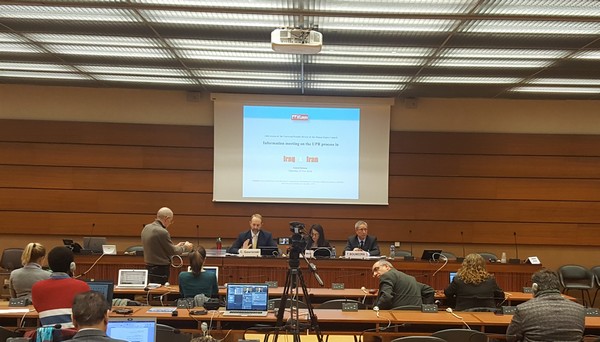
Mr. Gawronski then outlined that even though torture and ill-treatments often lead to death, the death penalty is the only official means to legally take someone’s life. He stated that the international community is putting pressure on Iraq to place an official moratorium on the use of death penalty, but that Iraq actually increased the use of such punishment, becoming one of the top three executioner States in 2016.
This increase has been observed while the national report states that the death penalty is only used for the most serious crimes and certain terrorism offenses. Concerns have been raised by the UN Special Rapporteur on Extrajudicial, Summary or Arbitrary Executions, who expressed in her 2018 report her dismay regarding the lack of transparency in the application of the death penalty, and the use of mass executions since 2016 to address terrorism cases.
Mr. Gawronski continued his presentation by tackling the issue of corruption. He outlined that while everyday people struggle to make ends meet, government officials are living luxurious lives. Since the US-led invasion in 2003, corruption settled at the highest levels of the government, which is one of the major issues that has prevented Iraq from having a normal economy since the invasion. Public services are non-functional in many parts of the country, resulting in lack of access to water, sanitation services, lack of medicines and health care facilities, and schools without supplies. This occurs despite massive government spending on public services and infrastructure, because most of the spending ends up in the pockets of corrupt politicians.
He raised the example of a tourist ferry in Mosul, which was overcrowded and sank in March 2019, resulting in the deaths of nearly a hundred persons. Local officials have been sacked by the government for this, raising the poor operation of the ferry, but local corruption is only a small part of the widespread corruption that exists at all levels of the government.
Mr. Gawronski continued by stating that the national report says all cases of corruption are investigated by the Commission on Integrity. However, the efforts towards fighting corruption lack credibility since the highest government officials are known to have participated in corrupt activities and this is recognised even by government officials, for example by Mr. Mash’an Al Jaboori who said on television that they are all corrupt. This lack of credibility and known corruption is part of the reason for the ongoing protests and of the demands from the Iraqi people. Recently, thousands civil servants were fired because of corruption. Mr. Gawronski acknowledged this step forwards but asked why it takes a month-long protest to have this small result, adding that the persons fired were mostly in low positions.
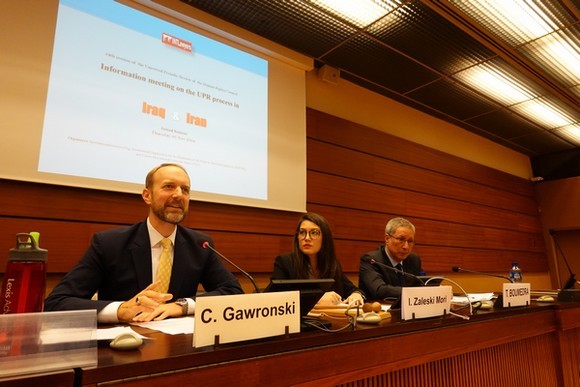
Then, he stated that several issues perpetuate the failure to maintain critical infrastructures across the country, including the lack of water systems, education and health care facilities, and electrical systems. Such failure is inherent even though the country gains billions from oil.
Mr. Gawronski evoked two cases: the one of Basra (southern of Iraq) and the one of Mosul. Poor water and sanitation quality led to hundreds of people being hospitalised in August 2018 in Basra. The evident health crisis was denied by the authorities even though local authorities issued a public advisory for people to boil their water before drinking it. A year later, over 100,000 people have been hospitalised and the water crisis remains. This situation belies numerous statements in the national report claiming the Ministry of Health and Environment has health-service strategies to contain infectious diseases and improve nutrition and food safety.
In Mosul, Mr. Gawronski explained that two years after the final offense against ISIL, critical infrastructure is still missing, such as hospitals, schools, electricity and water system; and that most of private housing and business buildings have been damaged or destroyed and not rebuilt. This situation led to hundreds of displaced and vulnerable citizens. As outlined during the presentation the government claims they protect civilians, but many displaced people from Mosul, as reported by GICJ, have been victims of harassment and discriminatory treatment by militias and other armed groups associated with the Iraqi military and government.
Finally, Mr. Gawronski tackled the issue of the recent protests, that are targeting the corruption existing in the government for years. Initially, in 2018, the government seemed to take note of the protests. Unfortunately, it did not properly address the concerns and, instead, met the protests with violence. In 2019, and especially in October, the protests continued with stronger resistance and increasing demands. Once again, the government met protests with violence, using rubber bullets, tear gas (even aiming tear gas cans at the people and killing them in the process - using a non-lethal weapon as a lethal one). This led the protesters to ask for the government to step down and for the constitution to be re-written to eliminate the sectarian-based system of allocating power which was put in place after the 2003 US invasion.
Moderator – Ms. Zaleski Mori
Ms. Zaleski Mori raised the importance of highlighting the government’s position of denying cases of enforced disappearances, which is a major issue in Iraq as people continue to be missing. She thanked Mr. Gawronski for emphasising the issue of water and sanitation, especially with regard to the situation in Basra, where thousands of people were hospitalised last year.
Then, Ms. Zaleski Mori introduced the second speaker, Mr. Boumedra, who served first as Chief of the United Nations Assistance Mission in Iraq (UNAMI) from 2009 to 2012, as well as Human Rights Officer. Then, he was appointed advisor to the Secretary General’s Special Representative for Iraq. He has a deep knowledge of the involvement of non-state actors in Iraq and other Arab countries.
Presentation on Iran: Mr. Boumedra
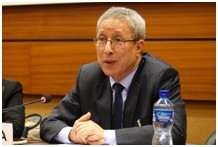 Mr. Boumedra started his presentation on the human rights situation in Iran by stating it poses a challenge to international law.
Mr. Boumedra started his presentation on the human rights situation in Iran by stating it poses a challenge to international law.
First, he made general comments about the UN Human Rights Council, which operates under an environment of power politics. He explained that its rules and all the hard work they are doing is regulated afterwards, not by the fundamentals of human rights but by politics and the need sometimes for appeasement.
Mentioning that he lived in Iraq, Yemen, and the whole Middle East, he stated that what is seen on the ground is completely different to what is discussed in the Human Rights Council and from the texts on human rights, as the Universal Declaration of Human Rights and the International Covenant on Civil and Political Rights. He underlined that it is very challenging to try to understand those texts in light of what goes on on the ground.
He said that the High Commissioner considers civil society and NGOs to be their eyes and ears and explained that, being the eyes and ears of the High Commissioner, and indeed of the whole human rights system, civil society should be bold in addressing questions about human rights, whether outside or inside the UN. Especially, he claimed that things should be called by their names. In the UN, the use of diplomatic language is required and is important, but this should not take civil society away from calling things by their names. He stated that human rights defenders should adopt this rule of being bold, objective and professional.
Then, turning to the human rights situation in Iran, he said that this is a very challenging one for the Human Rights Council. The Islamic republic of Iran, since the beginning of the 1980s, was monitored by a special representative of the UN, meaning the UN has been concerned by the issue of Iran for decades. However, he mentioned that the UN does not seem to be aware of what is going on on the ground and does not address the root causes of the deteriorating human rights situation in Iran.
On the relationship between Iran and human rights, he explained that because of the basis the Islamic Republic of Iran has been built on, clashes exist between the fundamentals of human rights and international law, and the fundamentals of the Iranian constitution. Mr. Boumedra outlined that the constitution opens the way for serious human rights violations, and that it was inspired by the Shi’a Islam of the Ja’fari doctrine – as set in Article 4 of the constitution. The constitution stipulates that you cannot have access to or reach power in Iran unless you believe in the Shi’a Islam of the doctrine of the Ja’fari, and that the society that has a rule for eternity and it cannot be amended when it comes to the implementation of the Ja’fari doctrine, as stipulated in Article 7. These provisions cause a challenge under international law as they are the root causes of discrimination. Mr. Boumedra portrayed the Iranian society as a highly civilised one, with a very civilised history, which suddenly invented a State built on discrimination against women and racial discrimination. These discriminations led to the violations depicted in many NGOs and UN rapporteurs’ reports.
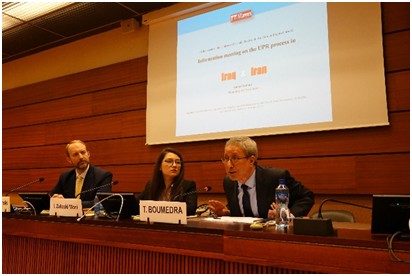
Coming back to the work of the UN, Mr. Boumedra explained that Special Rapporteurs prefer to keep the door half open, instead of being too bold and risking the door from closing. By doing so, Special Rapporteurs express their hope of educating the Iranian authorities on human rights by continuously addressing them, even though they know they are addressing a “deaf person”. He said that it always comes to the issue of which must prevail: does international law prevail over national legislation or the opposite? This point is constantly at the core of the discussion between the Iranian authorities and the UN since the 1980s, and no progress has been achieved yet.
To outline that lack of progress, Mr. Boumedra said that on one hand government’s reports tend to put some emphasis on recent legislation on the protection of children, juveniles, freedoms of women, the respect of freedom of movement and of expression. And, on the other hand, the Special Rapporteur on Iran raises what has been reported to him on the violations. In these dialogues, the Rapporteur hopes that there would be some progress; the Iranian authorities hope that the UN will be educated on Sharia law. Both stand firm on their positions. As Sharia law is a law that does not recognise the universality and indivisibility of human rights, the challenge between Sharia law and international human rights law remains intact.
After explaining this existing situation, Mr. Boumedra asked what is the way out, and how we can make the situation move from this challenge if no one wants to accept the other.
To put these questions in the framework of the UN, he recalled several articles of the UN Charter. Article 4 sets the conditions of membership of the UN, namely adhering to the principles of the UN, and being willing and able to implement them and incorporate them into the national legislation.
Articles 5 and 6 provide for possibilities of suspension of a member, or for the UN to take other measures against the State that does not accept these principles.
Which raised another question: why is the UN human rights system, which is aware of all the violations taking place in the Islamic Republic of Iran, not taking any action?
He recalled that the purpose of the Human Rights Council is not to force States to do things but to help the State and to encourage it; and that other institutions within the UN system, if the State is proven to be violating the Charter, can address the situation. He regretted that no country has been addressed in application of the Charter. Nevertheless, Mr. Boumedra claimed that there is some progress, though slow, including the use of norms of jus cogens by Special Rapporteurs and the Security Council.
In the case of Iran, the policy of keeping the door ajar has not allowed any improvements to be seen. Under pressure of the international community, the Iranian authorities sometimes do open the door widely but always put a stopper, which Mr. Boumedra referred to as the “claw back clauses”. This means they give things with one hand and take back with another hand, for example by adopting legislation to protect human rights but then subjecting it to Sharia law.
He presented the case of the ratification of Convention on the Elimination of All Forms of Discrimination Against Women: the Iranian parliament discussed it and decided to ratify it, but the council of the experts blocked the ratification because the Convention is not compatible with Sharia law. This method is used against improving the applicable law. He further raised the cases of the penal code, amended in 2013, and the code of penal procedure, adopted in 2015, which show improvements but then have to be compatible with Sharia law.
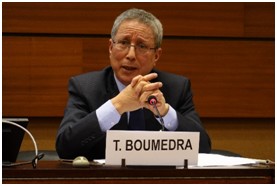 Moreover, Mr. Boumedra pointed out that Sharia law is not entirely codified and is sometimes created by individuals from remote villages, based on what they believe is Sharia law, which poses serious challenges. He stated that as long as this sort of duality of the system exists, and as long as Sharia law prevails, we cannot expect miracles. Special Rapporteurs have had such academic discussions with the Iranian authorities, which claimed that the law applied is a question of sovereignty, making, in the words of Mr. Boumedra, “the question of due process of law a joke”. Indeed, a judge who has a very limited education will have the authority, without any training on human rights or in law in general, to make rules. This needs to be addressed and cannot be ignored.
Moreover, Mr. Boumedra pointed out that Sharia law is not entirely codified and is sometimes created by individuals from remote villages, based on what they believe is Sharia law, which poses serious challenges. He stated that as long as this sort of duality of the system exists, and as long as Sharia law prevails, we cannot expect miracles. Special Rapporteurs have had such academic discussions with the Iranian authorities, which claimed that the law applied is a question of sovereignty, making, in the words of Mr. Boumedra, “the question of due process of law a joke”. Indeed, a judge who has a very limited education will have the authority, without any training on human rights or in law in general, to make rules. This needs to be addressed and cannot be ignored.
As an example of human rights norms that are overstepped in Iran as a result, is torture. The Special Rapporteurs and other mandate holders have documented that when arrested in Iran, in particular during the first days of the arrest, people have a high risk of being subjected to torture. But Mr. Boumedra asked why this should be reported as Iranian authorities will challenge the due process. He recalled that in 1988, the Iranian regime killed hundreds of people, allegedly in respect of due process. He stated that the Special Rapporteurs should clarify this situation and educate everyone on what the due process actually is. As an example he asked if, when the law provides for crucifixion or the killing children under the age of 18, we can call this due process just because a law says so.
To end his presentation, Mr. Boumedra stated that it is time for the Human Rights Council to raise these issues and address them. The crimes committed by the regime, including torture, amount to crimes against humanity, and thus accountability is needed. He regretted that despite reports form the Human Rights Council, no mention is made of making people accountable for torture. He asked why the Human Rights Council does these elaborative studies if then nothing changes on the ground. Therefore, it is time to address the root causes of the issues at stake in Iran.
First round of questions and answers
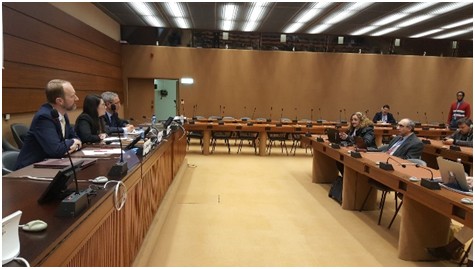
One Iranian women reacted on Mr. Boumedra’s presentation by saying that the constitution of Iran disregards the obligations of the State under the International Covenant on Civil and Political Rights even though the convention has been adopted after the ratification of this Covenant. She stated that Iran is currently working towards changing the constitution, but that the people of Iran have decided to aim for a peaceful transition, to not follow the path Iraq and Syria have followed. Coming back to the example of CEDAW, she mentioned that Iran is one of the six countries that have not ratified this Convention and that even the media is opposing the ratification of the Convention. She claimed that there is no will to change the system. She asked the panellists whether they have an idea of the budget for war given from Iraq to Iran.
A gentleman asked about who is really in control in Iraq, raising the control of the oil by the US and the fact that the US is a major contributor to the Office of the High Commissioner for Human Rights.
A third person asked what can be done by the international community for Iran to accept the international system.
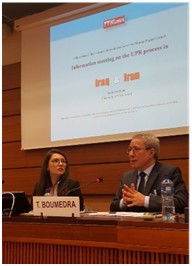 Mr. Boumedra said that, regarding the war budget, no figures exist as the government itself does not know. He mentioned that a chapter of the constitution covers the idea of an ideological army and refers to a verse of Quran saying that people should be prepared to face their enemies with all means necessary. Meaning having an open budget to spend whatever is necessary. The same constitution provides for the exportation of the revolution, the ideological army protecting and exporting the revolution. On the second intervention, he stated that when he was in Iraq (2008 to 2012), all services and goods are provided by one person only. He then explained that mandate holders and all UN staff receive special training on their language to make sure the NGO language is not imported to the UN system. He referred to the UN Secretary General’s programme to reform the UN, which was really ambitious, but then faced the reality and the bureaucracy. He reminded the audience that the UN is the biggest bureaucracy on earth, and that in addition it is plagued with power politics.
Mr. Boumedra said that, regarding the war budget, no figures exist as the government itself does not know. He mentioned that a chapter of the constitution covers the idea of an ideological army and refers to a verse of Quran saying that people should be prepared to face their enemies with all means necessary. Meaning having an open budget to spend whatever is necessary. The same constitution provides for the exportation of the revolution, the ideological army protecting and exporting the revolution. On the second intervention, he stated that when he was in Iraq (2008 to 2012), all services and goods are provided by one person only. He then explained that mandate holders and all UN staff receive special training on their language to make sure the NGO language is not imported to the UN system. He referred to the UN Secretary General’s programme to reform the UN, which was really ambitious, but then faced the reality and the bureaucracy. He reminded the audience that the UN is the biggest bureaucracy on earth, and that in addition it is plagued with power politics.
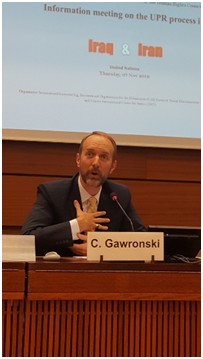 Mr. Gawronski, regarding the second intervention, mentioned that one of the things which must be understood on the current situation in Iraq is that from the time of the invasion, the US and the UK, which were the two main parties involved, completely reconstructed the State. What exists today has no relation to what Iraq was before: a stable country, with high level public services. By completely restructuring the State, they essentially demolished its primary institutions, either by creating new ones or removing them completely. It encouraged corruption and encouraged the State to be the way it is today. He said that, while it is very interesting to hear the US and the UK speaking out on the corruption, they do not help to solve the problem. Then, Mr. Gawronski explained the ongoing tension in human rights as a people versus State issue. With the Universal Declaration of Human Rights, the world began to identify people as individuals, whom should be the focus of concern and the ones taken into account. He stated that the State does have the power to do and accomplish things, and that this is how positive change happens. He mentioned the remaining tension existing between power politics and rules and treaties that actually provide certain rights. Finally, he claimed that the old system of States controlling everything is not how this should work anymore, and that civil society should find a way to encourage States to understand the importance of human rights.
Mr. Gawronski, regarding the second intervention, mentioned that one of the things which must be understood on the current situation in Iraq is that from the time of the invasion, the US and the UK, which were the two main parties involved, completely reconstructed the State. What exists today has no relation to what Iraq was before: a stable country, with high level public services. By completely restructuring the State, they essentially demolished its primary institutions, either by creating new ones or removing them completely. It encouraged corruption and encouraged the State to be the way it is today. He said that, while it is very interesting to hear the US and the UK speaking out on the corruption, they do not help to solve the problem. Then, Mr. Gawronski explained the ongoing tension in human rights as a people versus State issue. With the Universal Declaration of Human Rights, the world began to identify people as individuals, whom should be the focus of concern and the ones taken into account. He stated that the State does have the power to do and accomplish things, and that this is how positive change happens. He mentioned the remaining tension existing between power politics and rules and treaties that actually provide certain rights. Finally, he claimed that the old system of States controlling everything is not how this should work anymore, and that civil society should find a way to encourage States to understand the importance of human rights.
Second round of questions and answers
A gentleman asked who is in control of business in Iraq and explained that people have to restructure their way of thinking to address the question.
A lady confirmed that the constitution of Iran frames the foreign policy of the country on the basics of Islamic criteria.
Another person raised the recent protests happening in Iraq and asked what can be done by the UN and NGOs to put pressure on the Iraqi government to answer the demands of the people.
Mr. Boumedra said that “Allah would not change people unless they want to change themselves.” He explained that in his country, Algeria, people are entering the fifth month of demonstration and that the military regime is standing still, but that he is hopeful because of the awakening of the people, that is very peaceful and joyful but is not going to give up.
Mr. Gawronski, on the question regarding NGOs and the civil society, explained that now the protesters are putting pressure on the government and that they gathered much support. He stated that it is now up to the people in power.
To close this event, Mr. Boumedra added that unfortunately the Arab Spring led to more dictatorship and asked whether this “second row of the Arab Spring” will bring democracy. He outlined that the role of NGOs and the civil society is to not give up on this goal.
Watch the full side event online.
- Photo Gallery -
|
|





